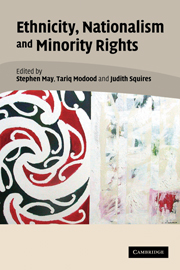1 - Ethnicity, nationalism, and minority rights: charting the disciplinary debates
Published online by Cambridge University Press: 22 September 2009
Summary
Introduction
This edited collection aims to bring together key perspectives and debates in social and political theory on ethnicity, nationalism, and minority rights. This is important because, despite the rapidly burgeoning literature on these topics in recent years within both fields, their discussion continues to be largely situated – we would say, constrained – within their respective disciplinary traditions.
One of the interesting features of the way disciplines develop is how they reflect their own distinctive starting-points and dynamics. For example, a generation ago, social theory was strongly committed to the Marxian proposition that the point of theory is not merely to understand the world but to contribute to changing it. Those in sociology who were not Marxists were more likely to favor a social democratic, “social engineering” approach (Popper, Kalakowski) rather than a systemic change but, interestingly, were also more likely to be working on more substantive fields within sociology. Nevertheless, it was a feature of sociology that it was organized by the idea of contemporary relevance and so, despite differing views of how contemporary relevance was to be demonstrated, theorists could not afford to become too remote from substantive studies.
This was not the case in political theory. Around the middle of the twentieth century, Anglophone political philosophy seemed to have retreated into linguistic analysis and the death of political theory was regularly announced until, in the 1970s, Rawls relaunched a liberal normative political philosophy.
- Type
- Chapter
- Information
- Ethnicity, Nationalism, and Minority Rights , pp. 1 - 24Publisher: Cambridge University PressPrint publication year: 2004
References
- 4
- Cited by

